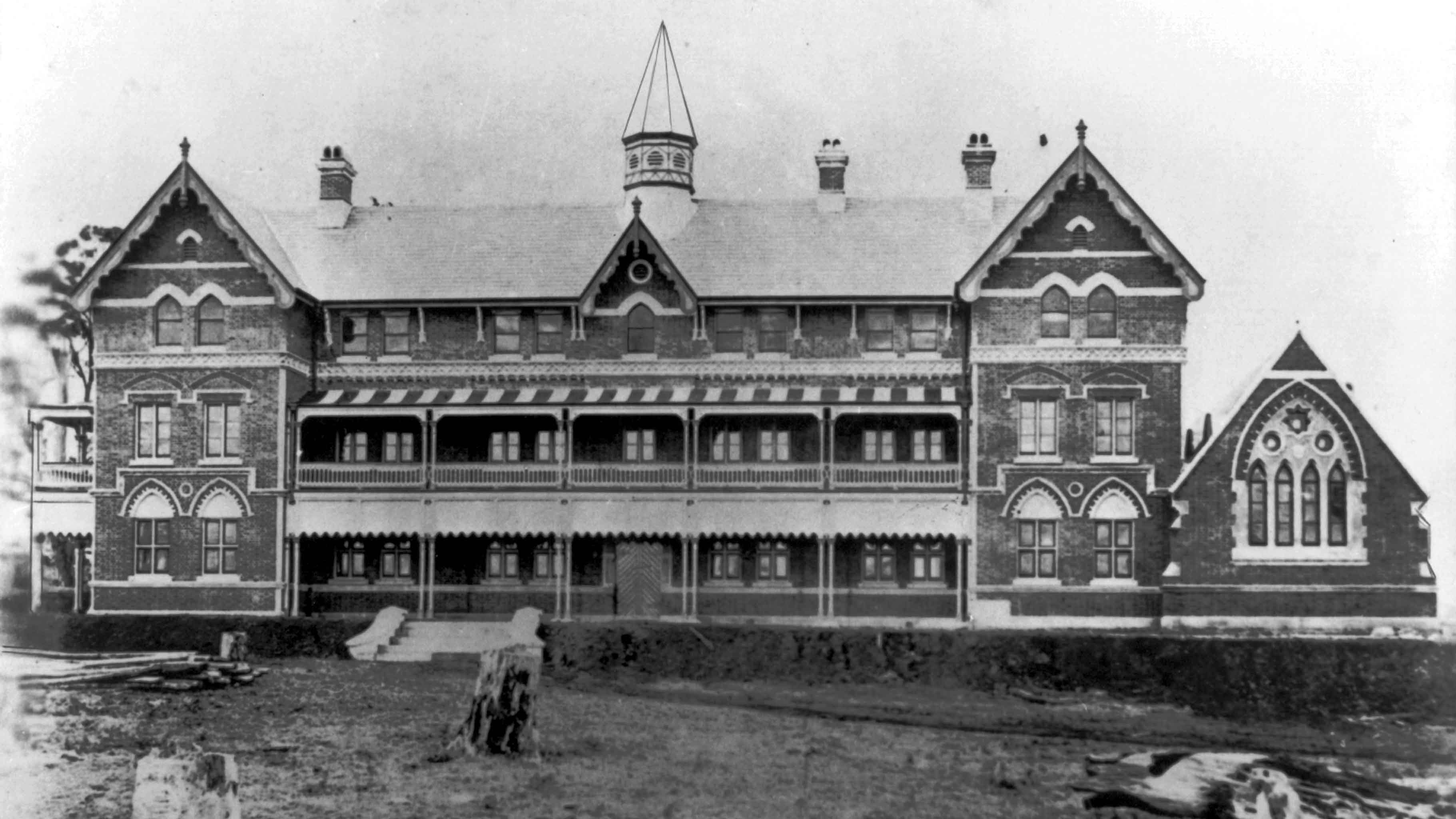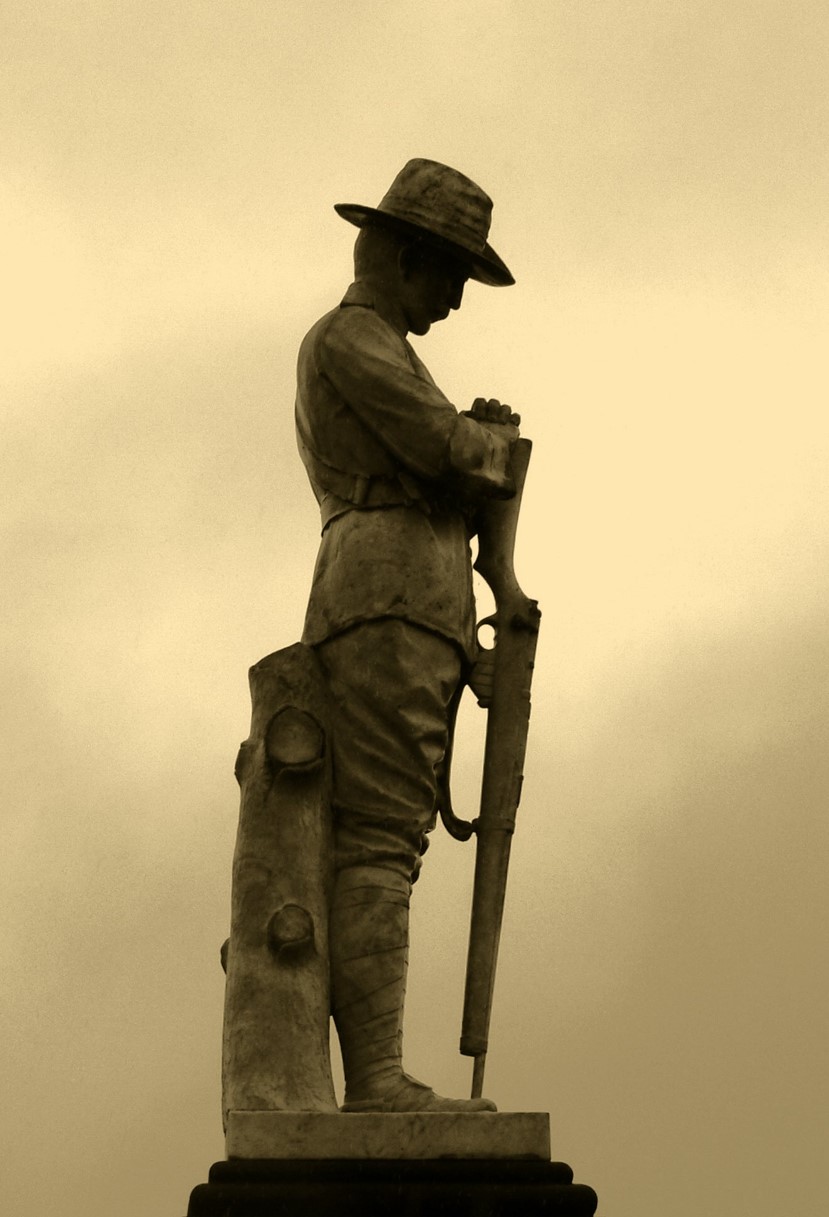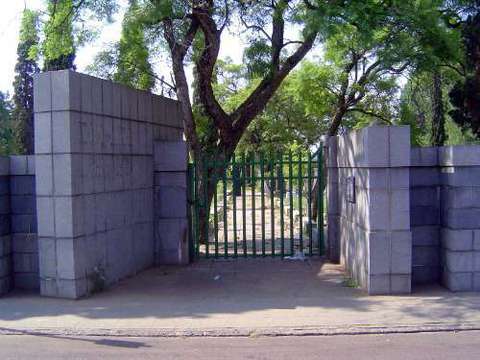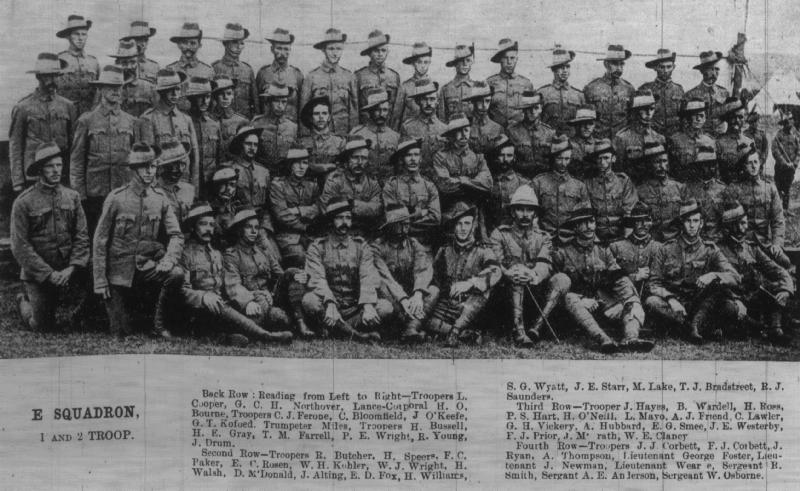
2nd NSW Mounted Rifles, E Squadron, 1st and 2nd Troops – Harry Spiers is in the Second Row, second from left
Toowoomba Grammar School Archive Records show that he was a student at the school from 1st January 1892 and left on 31 December 1892. He was born on the 20th July 1881. Interestingly that was the same year that the school established an Army Cadet Unit.
The following extracts are from the Crookwell Gazette published in Crookwell, NSW 44 kilometres north west of Goulburn, NSW.
Crookwell Gazette. Tuesday 5th March 1901.
OFF TO THE WAR.
Crookwell has not lagged behind the rest of the country towns that have supplied troops for service in South Africa. Besides Fred. Bashford, Bede Moylan and others who have gone to the front from other towns and who were natives of the town or district, Mr Whereatt, an old resident, has done good service against the Boers. With the present contingent we are also supplying our quota. Harry Spiers, William Tully, Jack Stephenson and P. Hearn, boys from here are going, and young W. Bashford also accompanies the present lot of troops. On Friday night a sendoff was accorded Mr H. Spiers by his numerous friends, who met at the Royal Hotel to wish him “God Speed”. There were a large number present, and Mr J.M. Pedley, who was voted to the chair, explained the object of the gathering. After the notional toast had been honored, Mr N. Hines proposed the health of ”Our Guest” in felicitous terms. The toast was drunk with enthusiasm, and with musical honors. Mr Spiers responded feelingly, and thanked the company for the manner in which they had honored the toast of his health, and for the good expressions for his welfare. He would endeavor to uphold the dignity of the Australians. (Cheers.) Mr J. Tozer, J.P., proposed the toast of “The land we live in”, and made reference to the patriotism displayed by the colonies in sending troops to South Africa to assist the mother country. He considered that the action had done more to immortalize Australians than anything that had been done by the colonies, and went to show the nations of the earth that, if assaulted, Australia was well able to defend herself. He offered some good advice to the young soldier who was going to the front, and hoped that he would endeavor to earn for himself the distinction of having the Victoria Cross conferred on him. Mr R.A. Howland proposed the “Officers of the British Army, coupled with the names of the Commander-in-Chief of the British Army (Field-Marshal Earl Roberts) and the Commander-in-Chief of the British forces in South Africa (Lord Kitchener)”. He eulogized the work done by the army, and made special reference to the tact and wisdom displayed by Lord Roberts. The Commander-in-Chief had left a worthy man in the hero of Khartoum. The speaker said Australians were not so amenable to discipline at first as the ‘Tommies”, but he hoped their guest would see that to be successful, the soldiery must be amenable to army discipline. Mr Hines proposed the health of Mr Walter Spiers, father of the guest. In responding Mr Spiers said it was the proudest moment of his life to hand his son over to his King and Country. Other toasts were duly honored, and the meeting broke up by singing “God save the King”, and “Auld Lang Syne”. During the evening young Spiers was presented with a handsome pipe and tobacco pouch, the gifts of Mr J. M. Pedley, tailor, and his employees. Spiers was one of the craft, although he was never employed by Mr Pedley. The presentation was made as a token of the high esteem in which he was held by the donors. The value of such a gift is enhanced, coming, as it did, from the master and employees of a rival business. Several songs interspersed the speeches, and all the toasts were enthusiastically drunk and with musical honors. Mr N. Hines ably presided at the piano, and was well assisted by Mr E.J. Houns. Young Spiers left on Saturday for Sydney, carrying with him the best wishes of the townsfolk for his success in South Africa and ultimate safe return. He was to sail today.
Crookwell Gazette. Tuesday 23rd July 1901. LETTER FROM THE FRONT.
Writing from Klerksdorp on May 18 to his parents at Crookwell, Trooper Harry Spiers says:- “By the time you receive this letter I suppose I shall get your answer to the letter I wrote on the boat. We went to Capetown first, but could not land on account of the plague. We stopped there three days and then went to Port Elizabeth and landed there. We had a nice little spread, when we landed, in the hall. It was given by the ladies of the Port, and I can tell you we enjoyed it. Our lot landed in the morning and left by train that night at 10 o’clock for Klerksdorp. We had nine days and nights travelling in a cattle truck, no covering over us or anything, with hardly room to stretch out or to sleep without lying on someone. We enjoyed the trip up, passing through TROOPER HARRY SPIERS 2ND NEW SOUTH WALES MOUNTED RIFLES SERVICE NUMBER: 1016 many towns, Bloemfontein and Johannesburg being the principal ones. The mines and breweries have just been opened at Johannesburg, and they say that the principal one will be under the main street. It is not nothing but a mass of mines. On the journey up we met thousands of cattle and sheep captured from the Boers – mobs such as 10,000 and 16,000 in them – and camps, upon camps of refugees. We landed at Klerksdorp at one o’clock in the morning, untrained our horses and pitched tents in the dark. We had a bad time in the camp – camped in among this red dirt – and when it was at all windy you could not see for dust. They shifted our camp over to the side of the river, and stopped there over a week, till Colonel Wilson took over the command. The Column left on Sunday at dinner time and we have now been out a fortnight. The first day we were out I caught a cold and got pretty bad; could hardly walk or stand, I am getting better slowly. It plays up with you when you are on the Veldt, sleeping in the open. The first place we went to was a place called Hartebeestfontein (a small town about nine miles from Klerksdorp), captured a lot of cattle, burned all flour and provisions and then set fire to the town- a nice little town it was too, oranges and vegetables in plenty. No wonder the Boers are holding out so long. After everything was destroyed we left there at one in the morning, came on to a couple of farms, took all the livestock and women and burnt the farms. Those are Lord Kitchener’s orders; all the farms are to be burnt. All the stock and women came on with us. It was about the fourth day we were out that we had our first shot. The column had camped near a farm and a party of us were sent out on patrol. On the other side we sighted about ten of them on the plain, and had a shot, knocking over one man’s horse. It was too dark to gauge the proper distance.
Another troop of our company also had a few shots the same day. The farm was burned and we moved on. The scouts reported about 300 Boers in sight, so the advance guard went up and engaged them. “E” Company were rearguard that day. We had to gallop up with the guns, which stopped on the hill and shelled the Boers. We galloped up in the firing line just in time to see the last of it. There were only one or two troopers of B squadron in it and one of D. Six men of B were shot dead, Lieutenant Lamb being one of them. Thirteen men were wounded and about thirty captured, including a lieutenant. The way they were cut up was through an ambush. A few Boers in front started retiring and they started in pursuit, when about 100 Boers came up in the rear of them. Captain McClean was also severely wounded. He was shot through the groin. We are now camped about three miles outside Klerksdorp on the Veldt, and will soon move out again with General Babington’s column. I don’t think the war will last long, now that they have started to burn the farms and take all the cattle and women. By Jove, it does cut the women up when they see their homes getting destroyed. To see the mob of Kaffirs and Boer women we have with us you would think there were no more in South Africa.” In a postscript, Trooper Spiers wishes to be remembered to all, and asked for the “Gazette” and some papers to be sent him. He says the life is pretty rough, the biscuits being as hard as iron. They get very little sleep, having only every other night in bed. He considers 12 months will satisfy him, men that have been out for 9 months being now quite sick of it. He enclosed a cheque for £1500 as a curio; it was got out of a safe in a big mine among thousands of others: (The cheque was payment of dividends, &c., and was cancelled). The wood Question is the worst nuisance. The cold of a night is terrible, while it is burning hot in the daytime. The letter was written on a horse brush.
Crookwell Gazette. Tuesday 10th September 1901. LETTER FROM THE FRONT.
Mr Walter Spiers, of this town, is in receipt of a letter (the second) from his son Trooper Harry Spiers, now on active service in South Africa, serving with the Second Mounted Rifles. The letter is dated July 21, from Klerksdorp and Mr Spiers has kindly supplied us with extracts from the letter for publication. After referring to matters of personal and private interest, Trooper Spiers goes on to say:- Since the first halt, we went a different direction altogether – right along the bank of the VaaI River and into the Orange Free State. It was here that I was first introduced to the firing line, and I can tell you it is a very funny sensation to hear the bullets whistling past you and digging up the ground near you. We killed 20 or 30 of them that day, and took about 80 prisoners, 24 wagons, and wounded about the same number. It is something marvellous to watch the way the artillerymen work the pom poms, which I think are about the most useful guns out here. All the columns numbering about eight, including ours, have been working from Klerksdorp all through and around the Magalesburg ranges. We passed over the place where Dixon was cut up. Nearly all his artillerymen were killed, and the Boers took two guns. The British charged and captured them again. We had fair times in these ranges. One thing it is not nearly so cold at night, and another you can get plenty of wood, which you cannot do on the Veldt, as many a time we have had to boil our quarts on a fire with manure for wood. The country in the ranges is splendid fighting country for the Boers; it would take about two or three hours to walk up most of the kopjes. You can see some very pretty scenery here, although to look at the hills you would not think so. Some of the valleys are all right – with all their green barley and rye in, and beautiful orange groves, with, I suppose, some of the best oranges in the world. There are any amount of cattle and sheep, and foodstuffs, and they wonder how the Boers live. Why I don’t suppose they would look at our rations. At any farms we come to now we destroy everything – burn the houses and take the women. The first thing we do when we strike a Boer’s house is to look for mealie and flour to make doughboys, as anything is a change from biscuits. We had some very lively times, fighting nearly every day, principally on Sunday. You can hear the big guns of the different columns booming every day; the worst of it is, though, when we do have a bit of a fight, and within sight of their convoy, he generally gives the order to retire. Our column does the work; another column comes along, captures the wagons, and gets all the praise for it. We captured all kinds of prisoners – Irish, Dutch, French – nearly all speak good English. It is the hardest thing out to find the Boers, as they are splendid at taking cover. You generally hear the bullets from the last place you would think of looking for them. Like it happened the other day. Our company were advance guard; we had a bit of fighting, and were coming back to join the column, and halted to give the horses a drink, when they opened up on us. Three horses were shot by the side of me that day. I was expecting one every minute, but my luck was in. We have done nearly four months trekking now. I don’t know where we are going to next, but I think it will be the Free State. Of course I have not much time to give you a full account of things. I will leave that till I come home.
Wagga Wagga Express. Thursday 27th February 1902. DEATH FROM ENTERIC.
Private Henry Spiers, of the Second N.S.W. Mounted Infantry, has died of enteric fever at Pretoria.
Crookwell Gazette. Tuesday 18 March 1902. PATRIOTIC SERVICE. The local Methodist Church was filled to overflowing on Sunday night, when a patriotic service commemorative of the death of Private Harry Spiers, of this town, whose death from enteric fever at Pretoria last month was reported in these columns, was conducted by the Reverend Joseph Walker. The church was suitably draped, and appropriate hymns and anthems were rendered. The Reverend Mr Walker took as his text, the second chapter of the second Epistle of Paul the Apostle to Timothy, 3rd and 4th verses, – “Thou therefore endure hardness as a good soldier of Jesus Christ. No man that warreth entangleth himself with this life; that he may please Him who hath chosen him to be a soldier.” He thought that the remarks of the Apostle Paul were singularly appropriate for the occasion, and were more than exemplified in these days of war. He referred in sympathetic terms to the sacrifices of home comforts and relatives that had necessarily to be made by the man who went forth to fight in battle, as was the case of their hero who had fallen in South Africa. He combated the idea that there was no need for the Colonials to leave their homes to fight for the motherland, and pointed out that Great Britain had taken up the cause of justice and right, and to relieve the wronged and oppressed as became her as the leader of Christianity. It was the highest standard of patriotism that they should be ready to assist. He would not discuss the merits of the war that night, but he would point out that the time of war was not the time for criticisms. The enemy was at their gates and had fired the first shot. That was sufficient for them, and truly patriotic in spirit they said, “Here am I, send me”. He characterized patriotism as a noble spirit, when exercised to redress wrongs. The man of today needed to be strong and imbued with the highest patriotism, who would stand forth and condemn the social wrongs he saw around him. It might be said that his remarks were inconsistent with that of a professing Christian, but he claimed he was a Christian man, and prayed that the war might speedily close, and that the times of wars might soon be a matter of the past ages, but until the spirit of Christ permeated the whole world it was nonsense for them to talk of laying down their arms. The war had more than justified them as Christians, and no one need blush because a loved one had fought and died in the battles against the Boers. Britain’s soldiers had manifested their Christian impulses by the humane manner in which a defeated foe had been treated, and he instanced the fact that the wives of the loaders of the enemy were cared for and clothed and fed just as were their own soldiers’ wives. There was abundant evidence that Christianity had influenced the warfare in a measure never before heard of. He (the Reverend Walker) vividly painted the dangers and trials and hardships that had been endured without a murmur by their men at the war; he read extracts from letters received from the late Private Spiers, and which appeared in these columns, and paid a high tribute to the patriotism as therein exhibited under discomforting and perilous conditions. True, he, Private Spiers had not died on the battlefield, but he had had to meet a more bitter death. It required far more grit to face death in the circumstances which their young friend had met his than facing the charge of the bayonet or the bullets of the enemy. Young Spiers’ patriotism and grit wore boldly exhibited in his correspondence while lying at the hospital, and the preacher characterized him as “one of Britain’s noblest soldiers”, notwithstanding that he was an Australian and a Crookwellite. He concluded by extending, on behalf of the community in general, and congregation present especially, the deepest sympathy to the bereaved parents in the loss they had sustained by the death of their son.
Crookwell Gazette. Friday 28th March 1902. THE LATE PRIVATE SPIERS.
Mr Y. Spiers, father of the late Private H. Spiers, who died at Pretoria last month, is in receipt of a letter from the nurse who attended his son in his illness. Private Spiers was a fortnight ill in the hospital, and, according to Nurse Marsh, he received as much care and attention as if he had been in a London hospital. She says she could not let the mail go without dropping a line, and describes young Spiers as a “bonnie laddie”.
Crookwell Gazette. Friday 28th March 1902. PUBLIC MEETING
. By advertisement in another column a public meeting is convened for Friday night next, at the Crookwell Hall, at 8 o’clock, for the purpose of considering the advisability of initiating a movement to raise funds to defray the cost of erecting a suitable monument to perpetuate the memory of the late Private Harry Spiers of the Second New South Wales Mounted Rifles, whose death from enteric fever at Pretoria, whilst on service, has already been reported in these columns. In a recent issue we advocated some such movement, and we are pleased to notice that the Crookwell Progress Association has decided to take the initiative, and we venture to predict that the public will fully acknowledge the propriety of substantially recognizing the sacrifice young Spiers made in leaving his home and its comforts to fight in defence of the honor and integrity of the motherland. Private Spiers went to the war as our representative, and judging from the reports from the seat of operations, he worthily upheld our end of the stick. It is most fitting, therefore, that the town and district should in some suitable and lasting way show a due appreciation of the sacrifice of the young life so willingly and so heroically given in the service of his country.
Crookwell Gazette, Tuesday 24th March 1903. PRIVATE SPIERS’ MEMORIAL.
The ceremony of unveiling the monument erected in memory of Private Harry Spiers, who died at Pretoria while on service in the South African campaign, was performed on Saturday morning by Mr Thomas Ross, M.L.A., in the presence of a large assemblage. The Town Band was present and played several patriotic pieces. Mr J. Tozer, chairman of the Committee entrusted with the work of collecting funds, &c, presided and after a few appropriate remarks, laudatory of the late Private Spiers, called on Mr Rose to unveil the monument. Mr Rose said it was both a sad and a pleasing duty that he was asked to perform. It was sad because it indicated a broken home, yet it was pleasant, inasmuch as it was to do honor to one who had responded to the call of service for his Queen and who had nobly laid down his young life in fighting for his country. Young Spiers’ action had the greatest merit in that he was not a professional soldier; he had been a mere schoolboy, but he had exhibited perhaps even a more noble spirit than the professional soldier who had been trained to fight. The present movement was a token of respect paid by his fellows to their comrade who so nobly fought and so nobly died. Mr Ross then unveiled the monument. It is the work of Mr J. Turner (Goulburn), and is a broken column, indicating a broken life, and suitably inscribed. A pretty spot for its erection has been chosen in Robertson Street, at the western end of the recreation reserve, and stands upon an eminence of rocks. It is a fine piece of work, and is a fitting memento of one who though so young did not fail when duty called.
Other letters were printed in the Crookwell Gazette on 26th November 1901.
The following are extracts from, ‘Official Records of the Australian Military Contingents to the War in South Africa’ compiled and edited for the Department of Defence by Lieut.-Colonel P.L. Murray, R.A.A. (Ret) – Naval and Military Press Ltd 2007 p106-120.
Second New South Wales Mounted Rifles (p106-120).
This regiment was established at Sydney upon pretty much the same lines as the 1st Mounted Rifles; except that, as no service squadrons were away, the whole corps was embodied in New South Wales. Preference was given to trained men who were good shots and good riders, subject to tests as ordered. The age limit was 20 to 40 years; standard height, 5 foot 6 inches and upwards; minimum chest measurement, 34 inches. Applicants were also required to be single men and to pass a military medical examination. Rates of pay as for Citizen’s Bushmen. Establishment authorized: 1 liet colonel, 1 major, 1 adjutant, 1 quarter master, 1 transport officer, 1 veterinary officer, 1 sergeant major(warrant-officer), 1 quartermaster sergeant. 2 cells. 2 medical orderlies, 12 batmen. Machine gun section; – 2 officers, 2 sergeants, 2 corporals, 12 gunners, 12 drivers, 4 batmen; total, 8 officers, 1 warrant-officer, 49 N.C.O.’s and men; total 58, with 34 horses. Five squadrons, each – 1 major or captain, 4 subalterns, 1 S. sergeant-major, 1 farrier-sergeant, 5 sergeants, 3 shoeing smiths, 1 saddler, 2 buglers, 6 corporals, 106 troopers (including 5 drivers, 5 batmen, 2 cooks, 2 wagon-men). Total of a squadron; 5 officers, 125 sergeants and rank and file with 125 horses. Total of the regiment, 33 officers, 1 warrant-officer, 674 N.C.O.’s and men (708) with 659 horses.
Clothing
Uniform consisted of F.S. Jacket, pants, puttees, and hat. Equipped partially with saddles.
Departure and Return
The regiment left Sydney on 15th March 1901. It consisted of 33 officers and 673 of other ranks, with 700 horses and disembarked at Port Elisabeth, 17th April. Of these, 2 officers and 25 others were killed or died, 3 officers and 10 others were struck of the strength in South Africa, 28 officers and 640 others returned to Australia. Embarked at Cape Town, on 4th May 1902; called at Albany on 21st May, Melbourne, 29th May and disembarked at Sydney 4th June.
Operations
- The 2nd New South Wales Mounted Rifles were engaged in operations against Generals De La Rey, Kemp, Potgeitiers and Vermaas:-
- Served in the Western Transvaal, under the command of Major-General Fetherstonhaugh, from 23rd April to the 1st October, the principal operations being the capture of Potgeitiers’ convoy on the Vaal, 24th May 1901; capture by the regiment of General De La Rey’s convoy of 106 wagons, a large quantity of cattle, ammunition, &c.
Served in the Eastern Transvaal, under Major-General Fetherrstonhaugh; engaged in many night marches, resulting in over 1,000 prisoners being captured.
Burial Location
Trooper Harry Spiers is buried at the Church Street Cemetery in Pretoria, South Africa. This is the same cemetery that Lieutenant Henry Harbord Morant and Peter Joseph Handcock are buried.
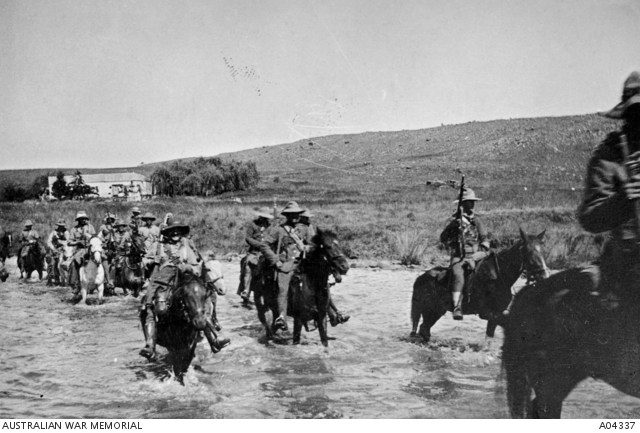
Troops of the 2nd Mounted Rifles
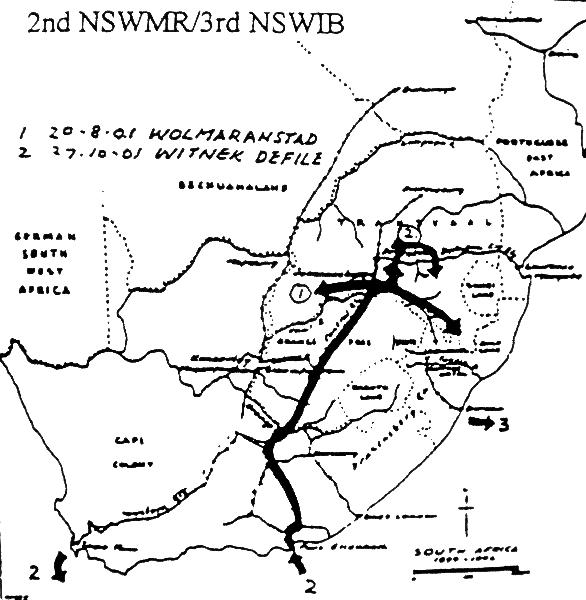
Map Illustrating the Activities of the 2nd NSW Mounted Rifles, 1901-1902
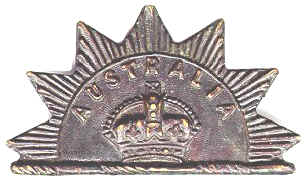
The Badge Worn by the Commonwealth Horse Units was an early version of the Australian Army Badge
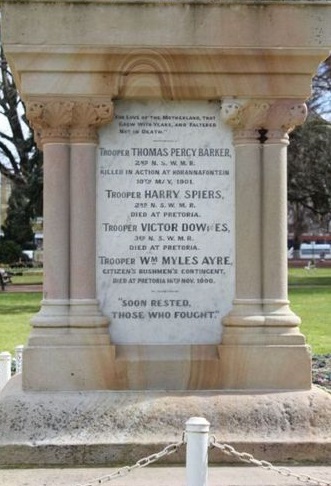
Goulburn Boer War Memorial
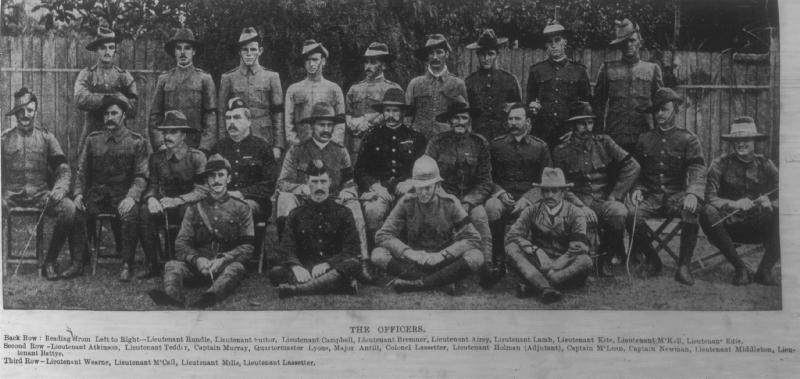
Officers of the 2nd NSW Mounted Rifles
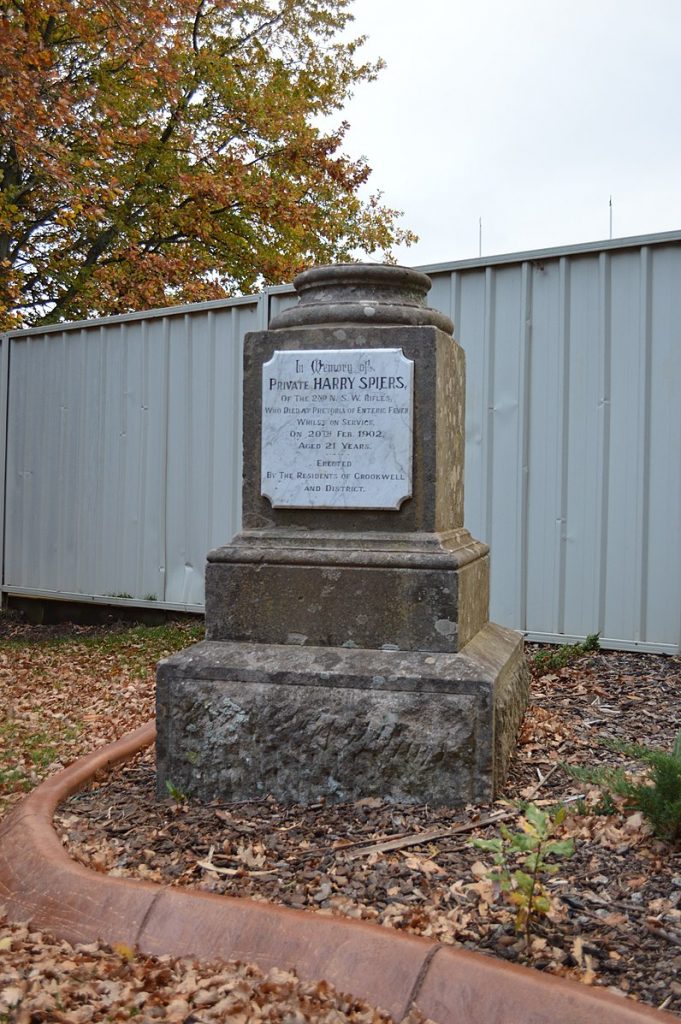
Crookwell Memorial for Harry Spiers
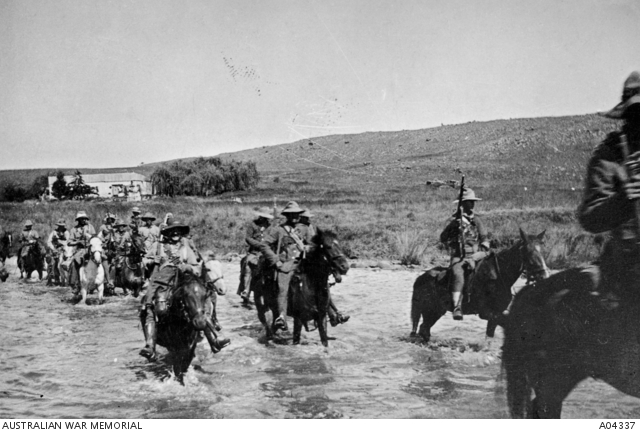
Troops of the 2nd NSW Mounted Rifles crossing the Orange River – courtesy AWM
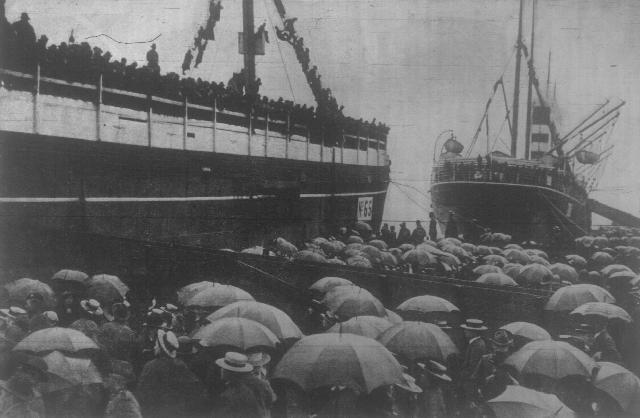
Embarkation of the 2nd NSW Mounted Rifles on SS Maplemore and SS Custodian at Cowper Wharf, Sydney
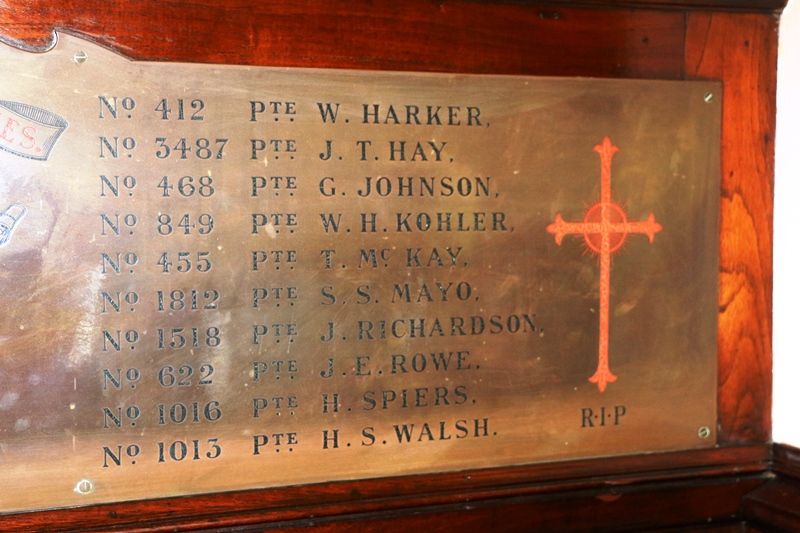
The stained glass window commemorates officers, non-commissioned officers and men of the 2nd Regiment, New South Wales Mounted Rifles who were killed in action or died in service in the South African (Boer) War.
On Sunday next, November 8, Sir Harry Rawson will, at St. James’ Church, unveil the memorial window presented by the officers and men of the 2nd New South Wales Mounted Rifles in memory of their comrades who were killed in action or lost their lives during the South African war. The ceremony will be performed at 3.30 p.m. Upon the conclusion of the service the contingent will march to the Federal Government House grounds, where the Governor will present the South African war medal to the officers and men of the regiment.
Evening News (Sydney), 2 November 1903.
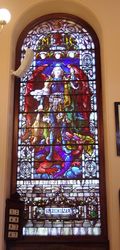
Stained glass window at St James
External Links
Australians in the Boer War Oz-Boer Database Project
AWM list of those killed in Boer War
AWM war unit diary 2nd NSW Mounted Rifles
Australian War Memorial Honor Roll
2nd New South Wales Mounted Rifles | Australian War Memorial (awm.gov.au)

